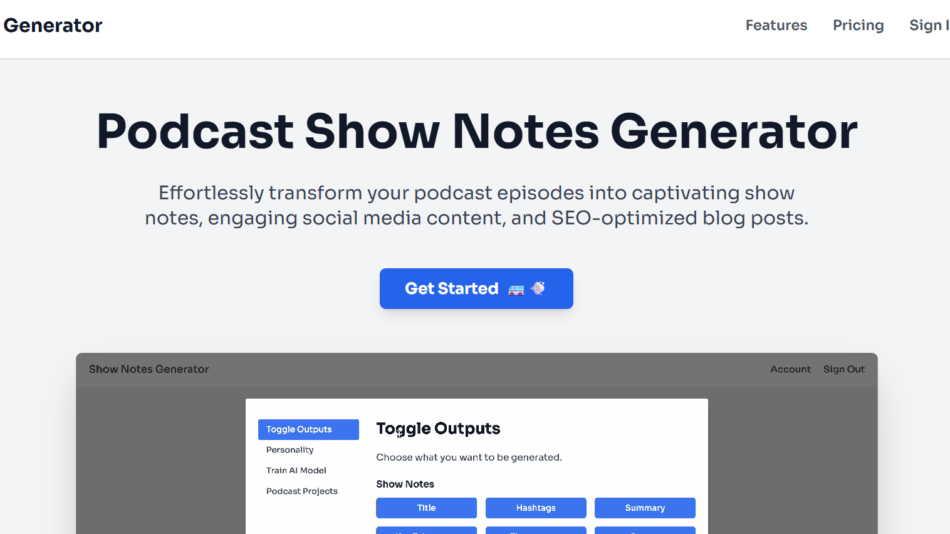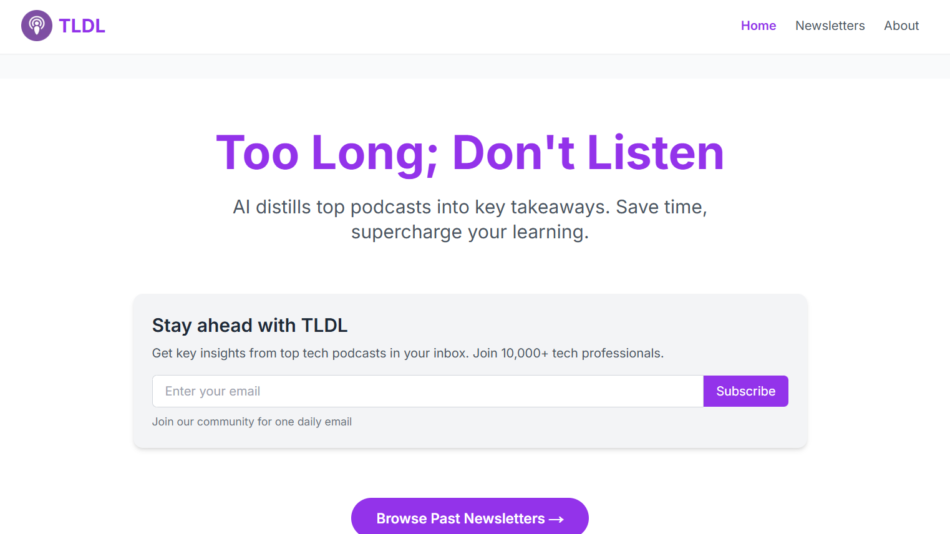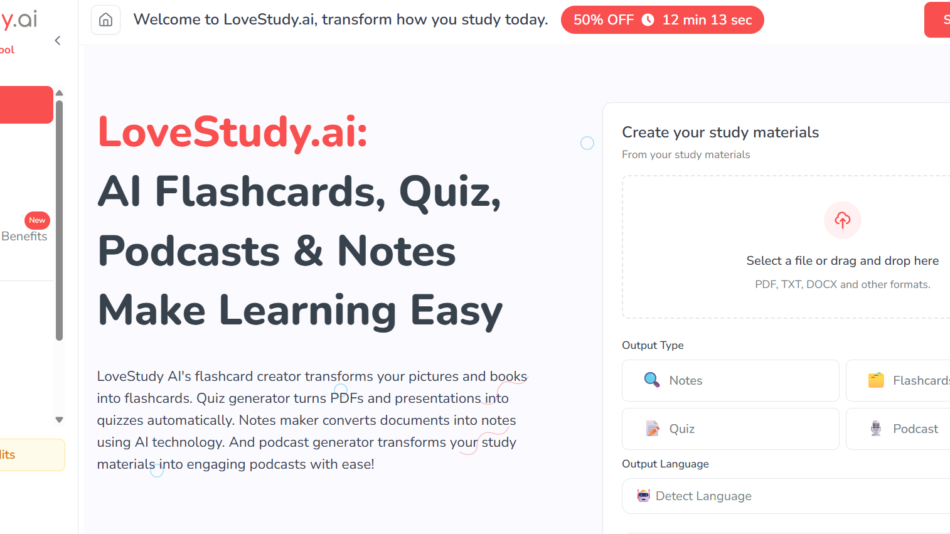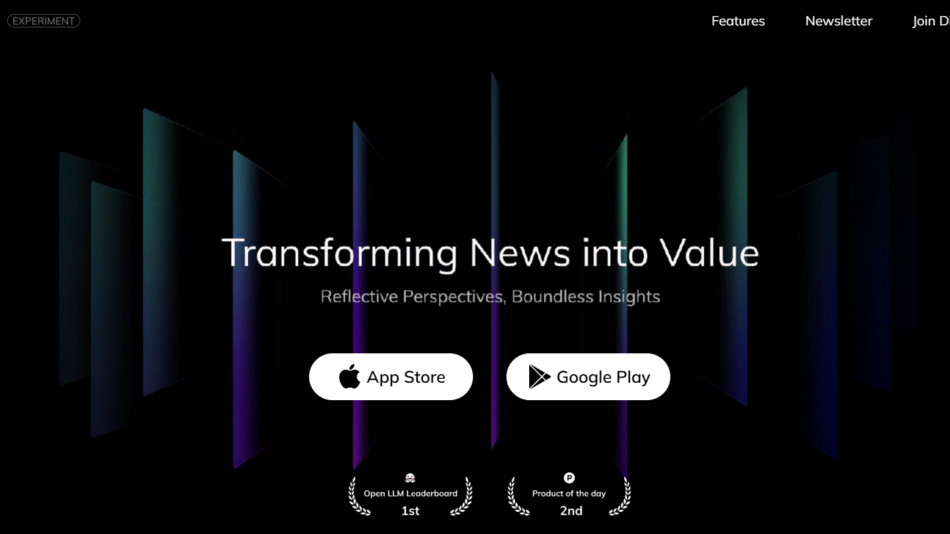Podcast.ai is an experimental weekly podcast created entirely by artificial intelligence. Developed by the team at Play.ht, Podcast.ai uses advanced AI voice synthesis and natural language generation to produce conversations and monologues that mimic real-world figures—sometimes even long-deceased icons.
Each episode is crafted around a specific theme, such as interviews with historical figures or discussions on current AI-related topics. The project is a demonstration of the capabilities of synthetic voice technology and large language models, offering a glimpse into the future of AI-generated media.
Whether you’re intrigued by virtual conversations with Steve Jobs or curious about the ethics of AI-generated voices, Podcast.ai invites listeners into a bold and creative intersection of technology and storytelling.
Features
Podcast.ai combines multiple cutting-edge AI technologies to produce its episodes:
AI-Generated Voices:
Uses voice cloning to recreate the vocal tones and patterns of real people—living or deceased.AI-Written Scripts:
Episode scripts are generated using large language models, such as GPT-based systems, trained on relevant data sets.Weekly Episode Releases:
New topics and personas are featured each week, from famous scientists to fictional or historical characters.Listener-Requested Topics:
Users can suggest future podcast themes or personalities to be recreated.Hosted on Play.ht Platform:
Powered by Play.ht’s AI voice and text generation tools, which offer studio-quality outputs.Audio Only:
Available as a traditional podcast in audio format, no video or visual interface.
How It Works
Podcast.ai combines two core AI technologies: text generation and voice synthesis. Here’s how it works behind the scenes:
Topic Selection:
The team chooses or receives a suggested theme (e.g., “an interview with Alan Turing”).Script Creation:
A script is generated using an AI language model trained on relevant content, simulating a plausible conversation or monologue.Voice Cloning:
Using Play.ht’s voice cloning tools, the system recreates the voices of the people featured in the episode.Audio Generation:
The final voiceover is synthesized, refined, and published as a podcast episode.Distribution:
Episodes are available on the Podcast.ai website and other major podcast platforms.
It’s a blend of machine learning, creative prompting, and digital production—all handled by artificial intelligence.
Use Cases
While Podcast.ai is itself a proof-of-concept podcast, the underlying technologies point to broader applications:
AI Research & Demonstration:
Showcases what AI can do in the fields of voice cloning, scriptwriting, and synthetic media.Education & History:
Reimagines how we might “interview” historical figures or explore complex topics with engaging dialogue.Media & Entertainment Innovation:
Inspires new formats for AI-assisted or AI-generated content creation.Ethics & Policy Discussions:
Prompts important conversations about consent, deepfakes, and synthetic representation.Marketing & Audience Engagement:
Allows users to submit ideas, encouraging co-creation and community interaction.Inspiration for Content Creators:
Demonstrates the creative potential of combining AI voice and script tools for podcasting and storytelling.
Pricing
Podcast.ai is a free-to-listen podcast.
There are no subscriptions, fees, or monetization mechanisms presented on the official website. However, the core technology used (from Play.ht) is a paid platform. If users want to create similar AI-generated audio or clone voices, they would need to explore the pricing for Play.ht, which powers Podcast.ai.
Strengths
Innovative & Unique Format:
Offers something no other podcast does—AI-driven conversations with digital recreations of well-known figures.Educational & Thought-Provoking:
Many episodes explore AI, ethics, and philosophy, fostering critical thinking.Quality Voice Cloning:
Realistic voices created through Play.ht make episodes engaging and immersive.Accessible Listening:
Available freely via the web with no registration required.Listener Interaction:
Users can suggest topics, giving the audience a role in shaping content.Great Demonstration of AI Tools:
Shows the potential of AI in real-world media and entertainment applications.
Drawbacks
No Human Fact-Checking:
As scripts are generated by AI, accuracy is not guaranteed. Some content may be speculative or fictionalized.Ethical Concerns:
Recreating voices of real people—especially deceased individuals—raises questions about consent and authenticity.No Real-Time Interaction:
Episodes are scripted and pre-produced—there is no live or dynamic conversation.Limited Episode Library:
As of now, the podcast is still building its catalog and has a limited number of episodes.Lack of Visual Content:
Purely audio-based—there’s no video or transcript available on most platforms.
Comparison with Other Tools
Podcast.ai vs Traditional Podcasts:
Unlike standard podcasts with human hosts and guests, Podcast.ai is 100% AI-generated—offering efficiency and scalability but lacking spontaneity.
Podcast.ai vs Descript:
Descript helps creators edit real audio/video content. Podcast.ai automates the entire creation process, including the script and voices.
Podcast.ai vs ElevenLabs or Resemble.ai:
While ElevenLabs focuses on text-to-speech, Podcast.ai combines voice synthesis with script generation to produce entire episodes.
Podcast.ai vs AI Voice Assistants:
AI assistants like Alexa answer questions in real time. Podcast.ai delivers narrative, long-form audio content using pre-generated dialogue.
Customer Reviews and Testimonials
Podcast.ai does not display traditional customer reviews on its site. However, feedback from listeners across Reddit, Twitter, and tech communities has been largely positive:
“That Steve Jobs episode gave me chills. It’s like hearing history reimagined.” – Tech Enthusiast
“The voice cloning is eerily accurate—both impressive and a little scary.” – AI Researcher
“Love how it makes AI concepts accessible and interesting to a general audience.” – Podcast Listener
Listeners often mention the podcast’s novelty, production quality, and its role in sparking discussions about AI ethics.
Conclusion
Podcast.ai is a fascinating experiment in AI-generated media, offering listeners a unique and sometimes uncanny experience: hearing what it might sound like if Steve Jobs gave an interview in 2025, or Alan Turing reflected on today’s world of artificial intelligence.
Though still early in its journey, Podcast.ai represents the future of digital storytelling—where content can be generated, voiced, and shared entirely by machines. It raises important questions, showcases technical achievements, and provides a new kind of audio experience for curious minds.















